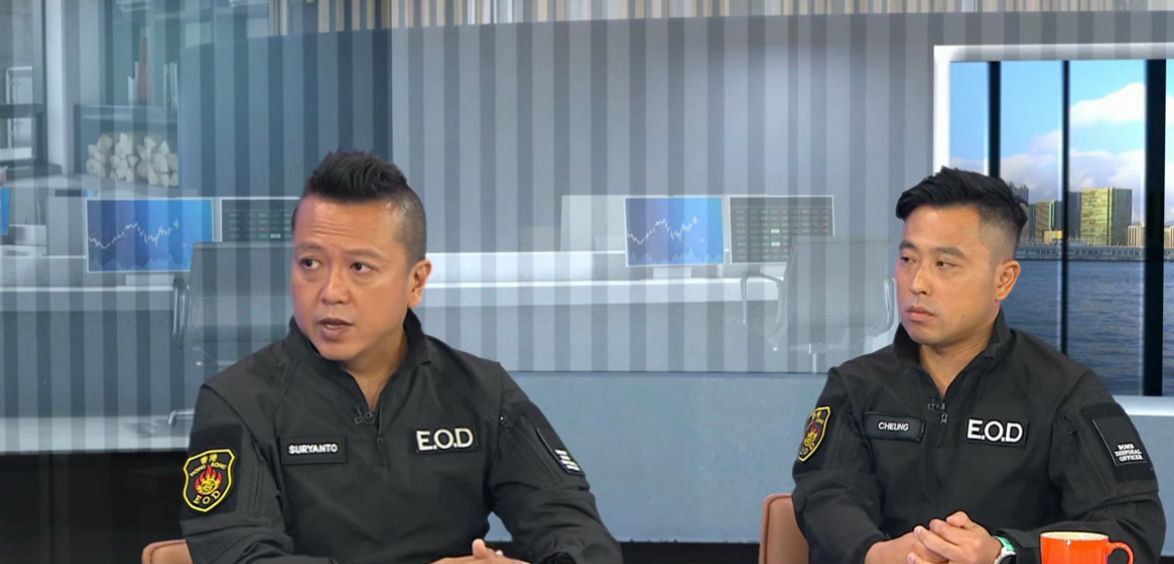
On Straight Talk this week, officers from the Explosive Ordnance Disposal Bureau of the Hong Kong Police Force are on the show to explain the teamwork and training behind highly-stressed situations where they have to defuse bombs to keep Hong Kong residents safe.
Check out the full transcript of TVB’s Straight Talk host Dr Eugene Chan Kin-keung’s interview with officers from the Explosive Ordnance Disposal (EOD) Bureau:
Chan: Good evening, and welcome to Straight Talk! I'm Eugene Chan, with this evening's episode titled “Defuse and Defend: Keeping Hong Kong safe”. Last week, a World War II bomb was successfully defused by the highly skilled officers of the Explosive Ordnance Disposal Bureau. We will speak to the Senior Bomb Disposal Officer Raymond Suryanto Chin-chiu and Bomb Disposal Officer Andy Cheung, who were both involved in this delicate operation. We will go on to find out more about the EOD bureau and how it has contributed to security for Hong Kong. Welcome, Raymond and Andy!
EOD Officers: Hi, Eugene, hello!
The bomb
Chan: Let's start with the story everybody is talking about. About 10 days ago, a relic from Hong Kong's wartime past, a massive unexploded bomb, weighing about 1,000 pounds was discovered at a building site at Quarry Bay. Around 6,000 residents, over 18 buildings were evacuated, and after a nine-hour rain hampered operation, involving cutting, incineration, and precision control, the bomb was made safe. I made a quick summary for you.
Raymond: Yes. Thank you.
Chan: So, Raymond, how was the bomb? How was it discovered in the first place?
Raymond: Okay. It was discovered by the construction workers, you know, during the part of the construction work, which is they have to dig up a large quantity of mud from deep underground. And when the earth was surfaced on the ground level of the construction site and they found something big, and, apparently, this does not look like any part of a piece of rock and not anything related to mud. It's a big piece of metal. And we did a lot of these ground works and safety briefing to some of the construction officers previously. And they did know that there was a possibility that some of the World War II relics or bomb could surface during these reconstruction of the area, in particular Hong Kong Island.
Chan: Let me ask you a direct question: what if they dig into the mud and they dig through the bomb? Would it explode?
Raymond: There will be chances.
Chan: Right. Has it ever happened?
Raymond: No, not in Hong Kong.
Chan: Right.
Raymond: But some in overseas, they did have some, you know, problems or disasters happening during the bomb disposal. Some of them is manmade, you know, during the digging. Some of them is after the bomb has been surfaced, like they found the bomb and they tried to drag it somewhere else. Some of them happened while trying to do the disposal, like the way that we do it, you know, trying to cut it open, do the incineration, and the bomb could go off any time.
Chan: Andy, let me ask you from the operation side of things. Once the EOD receives a call, what’s the protocol? Once you say, all right, we have found something, that possibly could be an explosive. What would you do?
Andy: Well, actually, first thing first, we have to confirm if the suspected item was actually a bomb. So, what we have to do is we have to go down to the scene, to actually inspect the item, because actually a lot of things have been found in construction sites. Actually, quite a significant number were actually misunderstanding.
Chan: Oh, really?
Andy: So, we have to go down, check it ourselves, you know, to unearth the whole thing, check the special characters of bombs, and then we identify whether it is a bomb or not. Once we identify it is actually a bomb, we identify the possible damage that it can cause to the surroundings, like this one is right in the middle of a lot of buildings. We have to prioritize what we have to do next – the evacuation and cordon.
Chan: Right. Raymond, walk us through the steps that you need to take with the nearby residence. I mean, to … I think most people caught attention in this case, because you have to evacuate 6,000 people. There’re a lot of people. How do you plan? And how urgent is it for them to move away from the site?
Raymond: Okay. Evacuation during these large World War II bomb disposal operations are different on every occasion. Our record was up to about 10,000 people, like back in 2018, Wan Chai North, and at this time, 6,000 people, number-wise. It sounds … it looks like less than our record, but indeed, the difficulties and the challenges are higher.
Chan: Why?
Raymond: Because previously, we evacuated people usually from the office and from the hotel, which you could imagine people with high mobility. You know, they can move. And this time, even though the number is smaller, but, you know, that involves a lot of elderly, you know, sick people, all the people that require care and attention. And that is a major challenge. So, you could see the time that we spent and the manpower that we input into these operations were high. And also involved a lot of the care teams from the district, from the local community to help. And that gave us a lot of help during the evacuation.
Chan: So, the District Council did play a big part in this?
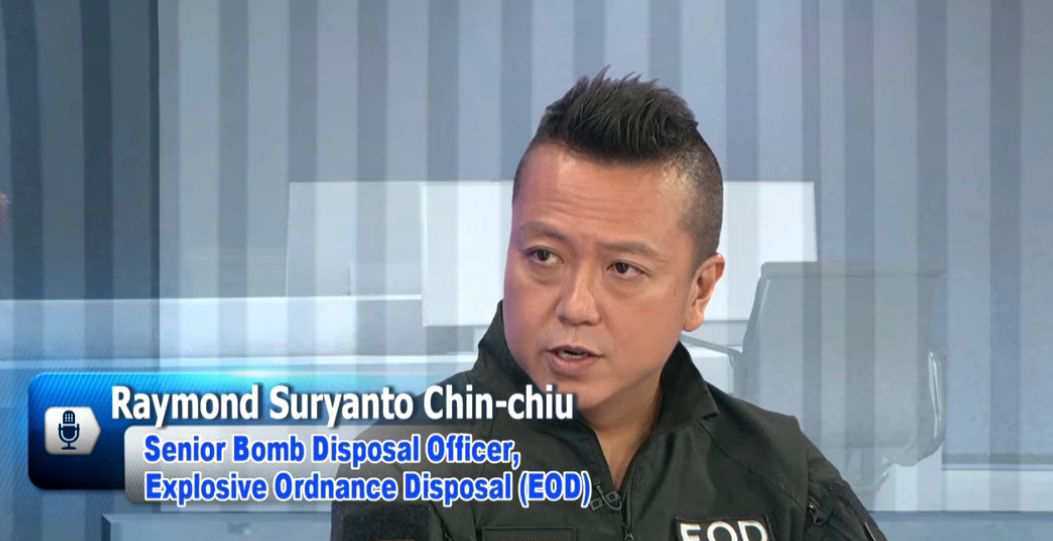
Raymond: Yes, indeed. And also our PNC, the Negotiation Cadre, they did send the people to try to explain and talk through and make them understand that this is crucial. Yeah.
Chan: Right. So, Andy, let's move back to your position as sort of … in terms of operation. What was it like to be in the hot seat because you're looking at the bomb, you could drill open it, incinerate it? It's not familiar to what we saw in movies, like in the movie called Shock Wave, where Andy Lau, we had two episodes. You see him in a very protective sort of gear, walking into the thing and thinking whether you cut the red wire or the black wire, and the clock is ticking. Is it like that?
Andy: Well, actually, that is actually a very common question that we got to ask. Is it like the movie? Because actually, it is actually the opposite. Because what we do is we all talk about safety. In the movie, they want excitement. So, exactly the opposite. For me, I was the duty BDO (bomb disposal officer) that day. So, when I got the confirmation that it was a World War II 1,000-pound bomb, all that in my head was just about the job – how to make sure the people around the place were safe. So, a big thanks to all the other departments that actually helped to do the evacuation and cordon. Because once we start, you know, doing anything with the bomb, there is a possibility that it will go off.
Chan: Right.
Andy: We have to make sure everybody's safe in the area before we can actually do anything. So, a big thanks to them. And then, once we got that confirmation at midnight, I thanked my boss here. He gave me all the trust that I have for my judgment, what I do to the bomb, what the procedure that I'm going to do. He got all the trust and I also thank my fellow colleagues, actually my brothers in arms. They trust my judgment as well. So, they follow through what I've actually planned. Once that started, actually, that's the only thing in my head.
Chan: Right. In this case, you chose to cut a 30-centimeter hole, which took four hours, and incinerate rather than detonate the bomb. Why not just detonate, like the movies, again? Why don't you just detonate? Why do you want to incinerate it?
Andy: To detonate, it is going to be a disaster because you'd be talking about over 500 pounds of high explosive. If it goes off in that location, the damage is just going to be unimaginable.
Chan: Really?
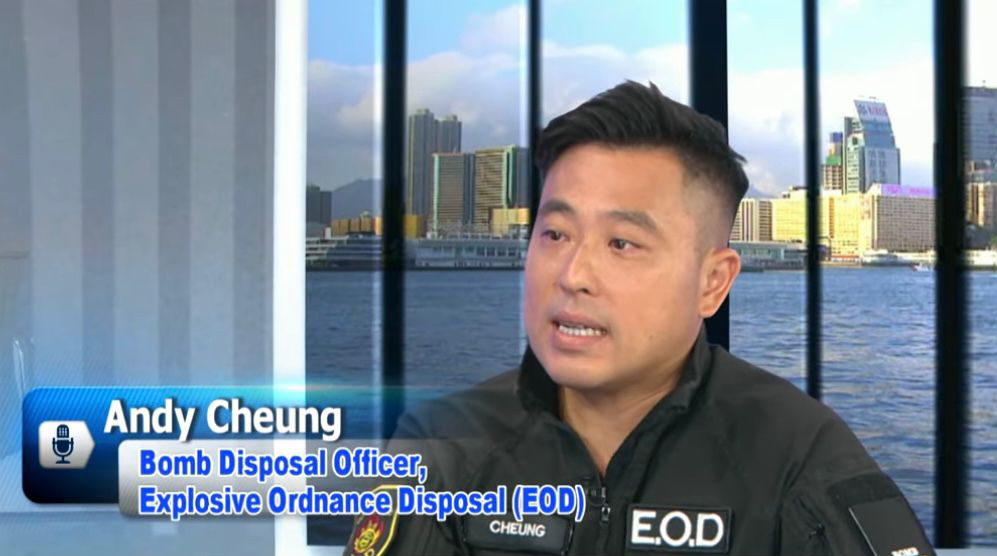
Andy: The closest building, you're talking about 20, 30 meters away. The building's going to be heavily damaged. The glasses in the surrounding few hundred meters are going to be damaged, I mean, the cost for the damage is going to be, you know, really significant. So, that would be the last thing we want. To cut it open is giving us a really good chance to try to, you know, consume all the explosive inside by low-temperature fomite, which is a relatively low burning explosive. That is, at the moment, international-wise, is the best way to deal with a large-size aircraft bomb, especially in, you know, crowded areas.
Chan: Right. Raymond, I mean ... I think you've done a very good job in leading a team, because he kept saying he's looking for the boss because his brothers are working. I think our CP Joe Chow is very happy because he promotes One Team concept, which is very important.
Raymond: Yes.
Chan: And then working with the community as well, with the District Council, it was actually raining heavily that day.
Raymond: Yeah.
Chan: Did it make any adjustment to the way you handle the case overall?
Raymond: Indeed, our so-called risk assessment and the safety protocol, once we devise and try to instill into that particular day's operation, we factor in a lot about this weather. And the weather is one of the key conditions that we need to factor in. And we could foresee some typhoon is coming as well.
Chan: Right.
Raymond: So, the whole operation has to be neat and fast in my mindset, and we make sure that we don't waste any time. And indeed, if you could remember, in the small hours on that day, the rain was heavy.
Chan: Right.
Raymond: And that postponed some of our procedures for up to an hour. But that's within our consideration. And we try to find our way to do a lot of our safety procedures, like cutting the bomb between the heavy rain, you know, the rain on and off, got heavy and then got less. In between, we try to do our best. And so, we have to pay much attention during the whole process.
Chan: Given Hong Kong's wartime history, although it's decades ago, how common are this discovery today? Is it going to be fewer and fewer, or do you expect that to happen quite regularly?
Raymond: Okay. After World War II, a lot of these areas were reconstructed with some sort of post-World War II high-rise building. But usually the level of the highness is relatively low. I'm talking about maybe five to 10 stories high. But you look back in time, now it's another generation. It's 80 years after the war. And it's another generation that the buildings built during that era are about to be demolished and will get rebuilt again. And the new building, definitely, you know the whole thing will be high, you know, 40 something storey high, and you will dig deeper. So, the more of these things will be surfacing.
Chan: We might see more.
Raymond: We might see more.
Chan: Right, before we go to the break, Andy, I want to ask you the last question, you are in charge of operation. I know you guys are well-trained. I must ask you a very direct and silly question. Is your family worried?
Andy: I think yes. Okay, the level of worry is based on whether they understand what we have been doing. You know, people from our side will consider this job a very high risk. I'm not saying this job is a low-risk job, but the more you adhere to our training, our safety procedure, and it is quite a safe job.
Chan: Right.
Andy: Actually, I mean, if you ask me, the support from a family is actually one of the key factors that actually, keep us doing this job. So, I bet they are slightly worried, but at the same time, they also trust our training, trust our profession. So, yes, but no.
Chan: Right, right. Time for a short break now, and we will be back with more Straight Talk.
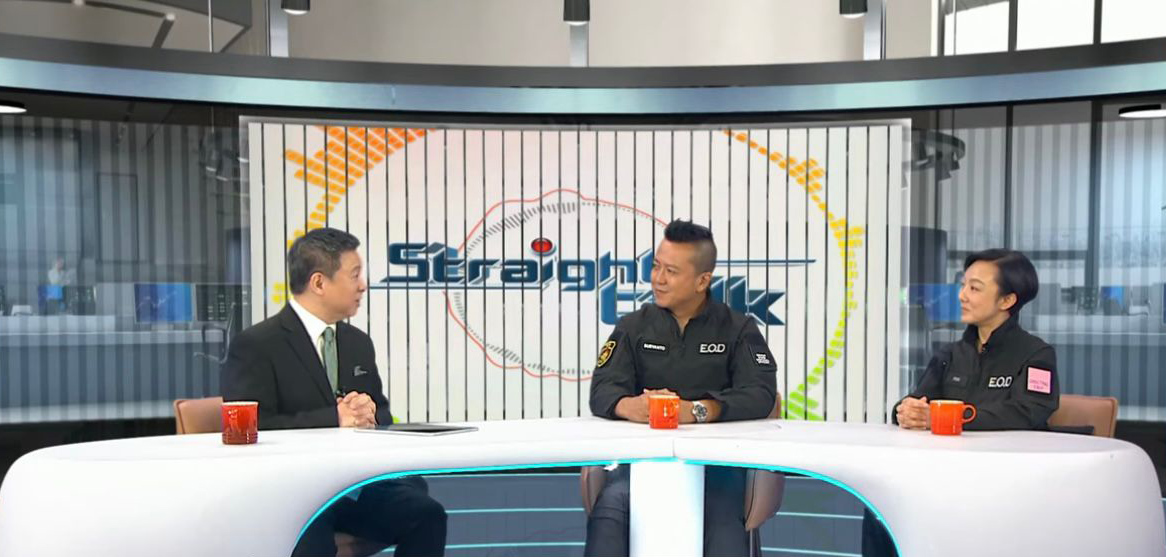
Background & scope of EOD
Chan: Welcome back! We have been talking with Senior Bomb Disposal Officer Raymond Suryanto Chin-chiu, and Bomb Disposal Officer Andy Cheung about how the EOD Bureau handled the recent discovery of a World War II bomb in Quarry Bay, and how they keep Hong Kong safe year-round.
Let's now welcome Suzette Foo now as Directing Staff at the EOD. Welcome, Raymond, again and Suzette! And we have already run through what happened 10 days ago, and let's go back to the EOD, which I am sure a lot of viewers are not familiar with. So, when was it established and how many people do you have and what do you do?
Raymond: Okay. All the story went back to 1967. You know, during that time, Hong Kong got another big problem as well, a lot of bombs being found and it was a record high. And it was officially started in 1972. And in between the time, there was a lot of these so-called Royal Bomb Disposal Officers from the United Kingdom. They flew to Hong Kong and tried to assist because they had the experience of dealing with the IRA (Irish Republican Army) during that time. And then, the so-called department or the unit started up at that time, and then of course, generation by generation, now it become the majority local.
Chan: Right. So, I mean, where are you based normally? And how do you do your training in general?
Raymond: You mean our … the training that we do is around the world.
Chan: Right.
Raymond: We will try to, because the bomb got no boundary, especially the World War II bomb, the cases, and also nowadays the homemade bombs … all the techniques we share worldwide. And, basically, that involve a lot of these humanity issue, so the data shared between the bomb disposal units worldwide is easy. And our base is in Hong Kong, and Hong Kong Island. And basically what we train is: we will maintain our training to a very up high standard and to send our operators worldwide, wherever it is available.
Chan: Right. So, madam, you are the Directing Staff for the EOD, and I know you have been with the EOD for a few decades. You are very experienced. How does a normal police officer be able to join this meaningful job? How do they get in to be part of the EOD?
Foo: Just like a lot of the police recruitment, we would have normal advertisements, now a notice board, and whenever they need people, then we can just apply by ourselves. And at the moment, I think that it is not a few decades, two decades.
Chan: Right.
Foo: And so, I see the recruitment ad, and so I apply for it, and then eventually we have to go through the selection. And so, we enter the basic training, which lasts for about eight weeks at that time. And so we have nine of us to start with, and then, later on, we have three remaining, just the three can pass.
Chan: Right. So, if sort of a normal police recruits, if you want to join EOD, do they have to apply and then they can be full-timers? Or they have to do any part-time work first?
Foo: Every one of us, just like Raymond and also Andy, we go through the same path – we will be the part-time first, as a cadre member, as we will call it. And so as a part-time, and then eventually when you find that you are really interested, and also the EOD will find you suitable, then you will just match with each other.
Chan: Right. Being a female officer, do you see any advantage being a female officer in the EOD Bureau?
Foo: Actually, in the Force, it is quite fair. And, so, from my experience in overseas, sometimes they will emphasize on sexual equality.
Chan: But in Hong Kong, there is none of this problem.
Foo: Right. But it is a little bit difficult because at that moment, they are all male. And so I am the first lady. And so during the training, they have to separate a partition for me to stay over when we have the exercises. And so it is with some kind of barrier, and they just pretend that I have a private area for myself.
Chan: Right.
Foo: Yeah.
Chan: So, being the unit head, do you welcome females into your unit?
Raymond: Indeed. We have some proportion of the female officer in the unit, basically the part-time member. And some of the performance is I will value them higher than the male officer.
Chan: Oh, really?
Raymond: In particular, you know, how to stay calm during the high stress. But of course, physique wise, you cannot compare the female officer with the male officer, in particular when you are relate that to equipment because the equipment is built for your safety, and not for the particular physique of the people. Especially that the Asian physique is generally, you know, like smaller than the European. But all these safety equipment are built for the worldwide operator, so, there is no differentiation.
Chan: Right. I think that goes back to what we said earlier in the first half is one team concept.
Raymond: Yes.
Chan: You need the calm females to make sure everybody is steady, and then with your physique, you can do the rest of the work.
Raymond: Yes.
Track record & lessons learned
Chan: Apart from this, beyond this unexploded bombs, what other kind of threats does the EOD have to face? I am sure you have the terrorists, I mean the world is getting quite unstable now, and we had the 2019 riots. Can you share with us what is your role of EOD during the 2019 riots?
Raymond: Our primary duty is to make Hong Kong safe, that we form these defense lines, just to ensure that whatever the unit, especially the frontline police officers, when they came across with anything in dealing with the dangerous goods, like explosives, home explosives, chemical devices, that they knew that there is some backup there. If they need us, we will be there. So, my job is to make sure that our training are adequate, and our men, our operator, and manpower are always ready physically and mentally, when we are required for the job. And I would say we are ready to go to help, and to make sure that some of the high risk jobs that some people are capable to handle.
Chan: Right. Madam, I know that apart from you being a part-time cadre of the EOD, you are also the head of the School of Professional Development of the Hong Kong Police College. How do you see the EOD standard compared to international standards? Where do you see us now? And do you see that we need even more exchanges? And how can we maintain this high standard to keep Hong Kong safe? What is your view?
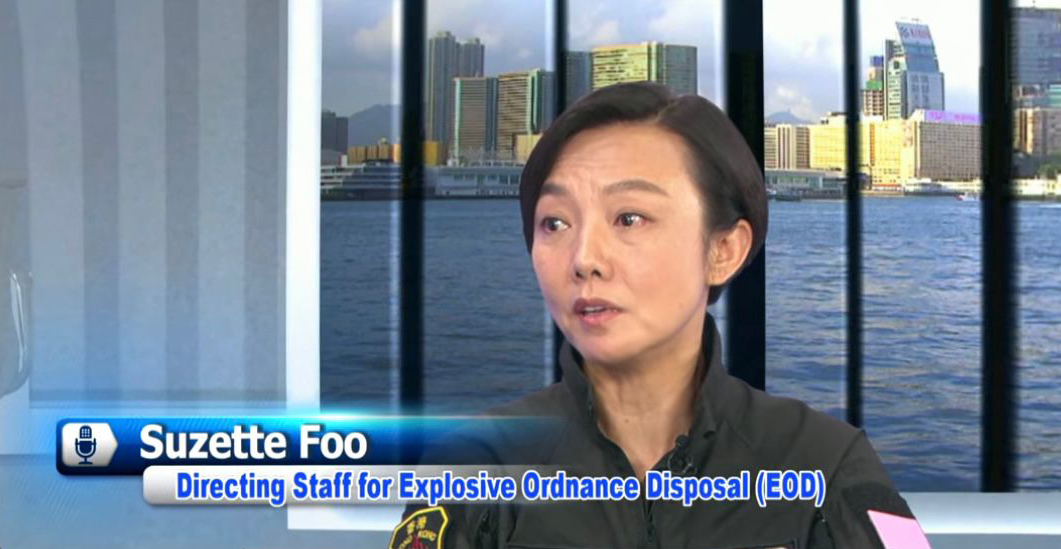
Foo: I think that comparing to the overall training for the whole force, I think that EOD is quite up to a very high standard for international exposure. And so, as from the force’s perspective, we aim to provide different chances for our officers to go overseas, as well as mainland now. And so we need to upkeep our officers' standard. And so, in comparison to a lot of different areas of the world, I think that we are on a very top-notch.
Chan: Right. So, Raymond, I must ask you for the head, I am sure CP and the government is watching. Do you have enough resources?
Raymond: Indeed, I would say resources are never enough.
Chan: Right.
Raymond: But we will try to do our best within the frame, and just to make sure that we keep ourselves in a very high standard, equipment-wise and also mobile-wise.
Chan: Right.
Raymond: And manpower-wise, we have to upkeep our boys in a very, very high standard, and we work as one team. And just to make sure that at all times, we integrate well with the frontline police and the divisional resources.
Chan: Right. So, apart from this recent successful defusing of this World War II bomb, can you share with us some of your other operation successes that we may not have been … I mean not as high profile in this case? Can you share with us?
Raymond: Indeed. I think there is a lot of very successful operations, and the number judging for these successes is because we can always bring our operators safe home.
Chan: Right.
Raymond: This is one of the things that I always keep in my principle, number one – how I am able to upkeep my boys to bring them home. And second of all is a lot of our cases that we follow a very good procedure. I will share one case we have dealt with involving one of the naval miners about three years ago in the Shek O area. Since the commencement of the Hong Kong Police Force almost like 200 years, that was one of the remarkable cases, and that was a huge bomb as well. And that is quite a lot, I cannot name everything for the moment but remarkably I am happy that it is all about the teamwork.
Chan: Right.
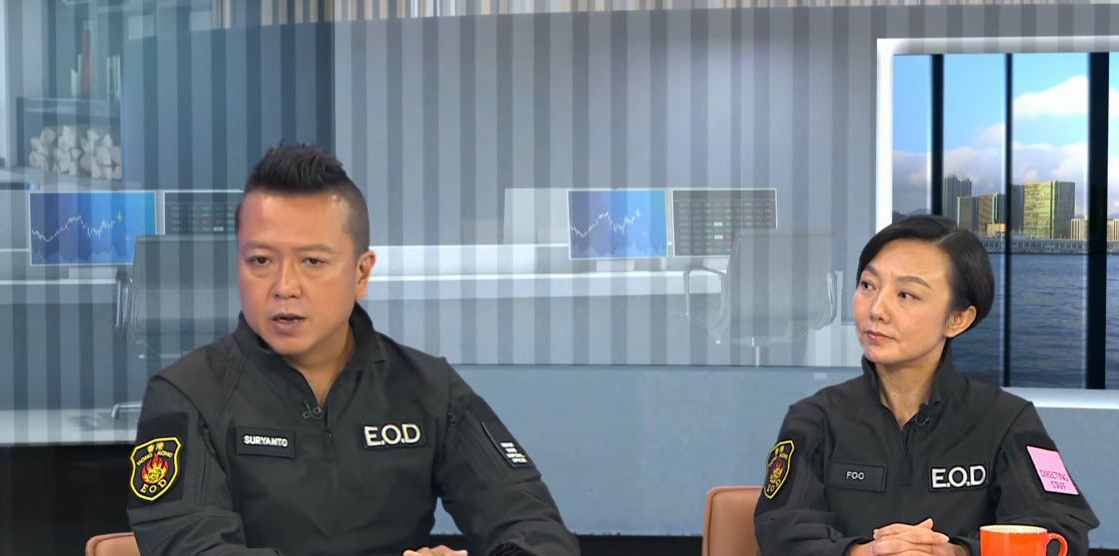
Raymond: We seldom try to claim that this is an individual success or someone should take the credit for all. Like I always said, you know one team's success is the whole team's success … We don't go for individualism, and we don't go for heroism.
Chan: Yes, so, maybe I will ask you another question. What should members do if they suspect something that could be an exploded device? What should they do?
Foo: Stay calm, report to police.
Chan: Right, not selfie, not take a picture first.
Foo: No, never, and just stay away. And so just call police. We will be there to help as always.
Looking Ahead
Chan: Right. So, Raymond, as a last question, with all that is happening, with your experience as the head of the unit, do you foresee more of such risk, sort of explosive, and also even self-improvised devices, do you see that incidence being higher or do you think it is going to stay at a low level?
Raymond: I would say the risk is going up and down, that depends on the geopolitical issue, and also a lot of these are happening worldwide, you know. A lot of these new equipment, new gadgets, new tactics. The only thing that we always try to mitigate the risk is to keep ourselves really updated and refreshed, and willing to accept new ideas, new technology and equipment. And also we are up to a very good training, just to ensure our team is ready.
Chan: Right. So thank you, Andy, Raymond, and Suzette, for giving us a first-hand account of the Quarry Bay bomb operation, as well as a glimpse into the work of the EOD Bureau.
Viewers, because of the expertise, dedication, and bravery, the EOD Bureau can defuse and defend our city, keeping Hong Kong people safe 24/7.
Thank you for joining us on Straight Talk, and have a good evening.


